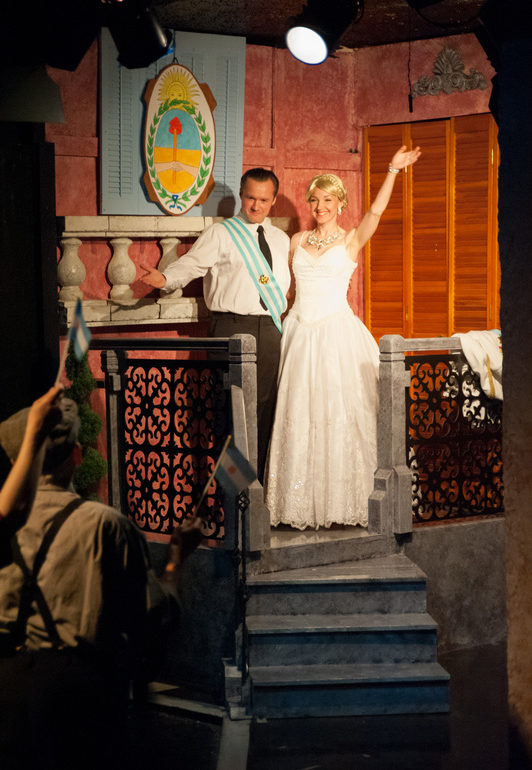A year lasts forever and a day when you’re on top of the world. The Audrey Herman Spotlighters Theatre production of Evita will only last five weekends but will strike a chord in the hearts of theatergoers across Charm City that will easily resonate for a year. The music of Andrew Lloyd Webber and lyrics of Tim Rice come together under the Direction of Fuzz Roark and Musical Direction of Michael Tan in a pure and sublime performance of one of the most dizzying historical tales ever told in musical theatre. Delivered with truth, there is grit and humanity in the gods that walk among the people of Argentina; the story of a dictator and a polarizing street princess too enchanted to be fantasy, too historical to be true. A performance if ever there was one as Spotlighters boldly mounts the magnificent musical in all of its mountainous grandeur, delivering a satisfying evening in the theatre that will touch the mind if not the heart and soul.
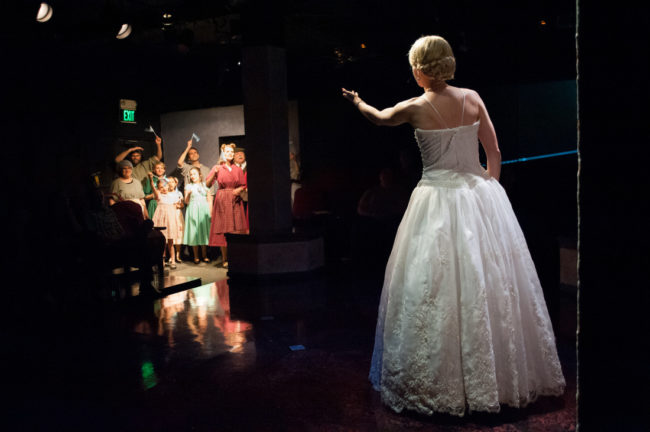
Scenically resplendent, Resident Set Designer Alan Zemla captures the heart of Buenos Aires the way Santa Evita captured the heart of her people. Warm coral walls create the street scenes that fill either corner of the stage’s back half and are complemented with oceanic blue window shudders. The set remains otherwise simplistic, using the space’s natural pillars for Ché to take a stand upon. The minimalist focus not only serves the fluidity of the production but echoes the meager beginnings of Eva Duarte’s roots. Zemla defies the laws of physics once more and produces a raised balcony inside the intimate space so that the iconic number “Don’t Cry for Me, Argentina” as well as several other scenes can occur in the appropriate environment in which they were written.
Lighting Designer Al Ramer draws emotional focus to Zemla’s scenic work. When spicier numbers are rolling their way across the stage, especially in the earlier moments of the production, Ramer fits the bill with warmer lighting. In more emotionally detrimental moments— like those featured in “You Must Love Me”— Ramer cools the heat of his luminescence into more mellow hues of blue and occasionally softer whites to appropriately echo and reflect the feelings exchanged among the performers in these moments. Subtlety is key to Ramer’s successful light work as it reinforces the audience’s emotional experience, which is drawn almost exclusively from the sung performances, rather than abashedly informing them by being overly theatric.
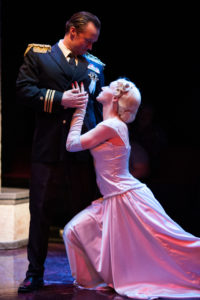
While the peasants aren’t much to look at, given Eva’s sartorial selection it’s no wonder that there is a Costume Team. Led by Hair and Wig Technician Andrew Malone, the Costume Team (comprised of Malone, Diana Haberstick, and Darcy Elliot) gives Argentina’s first lady a wardrobe of wonders that define her personality to perfection. The black and white Dior-inspired couture featured in “Rainbow High” is strikingly fitted upon Eva and augments the ferocious attitude that possesses her in this number. Malone’s wig work for Eva is striking to say the least, and breathtaking when showcased with the diamond gown worn during “Don’t Cry for Me, Argentina.”
While Evita, as a classic to the musical theatre stage, isn’t known for its flashy dance numbers, Choreographer Nancy Flores doesn’t miss an opportunity to show off a great deal of Latin American influenced dance styles. Though the Spotlighters stage presents an enormous challenge when it comes to arranging any sort of complex movement, Flores handles the challenge with a seasoned flare, dancing only a small contingency of the female or male ensemble at any one time. Mostly using tango, flamenco, and salsa influences, Flores alights a hot-blooded feel to the dance routines that shimmy their way across the stage in ensemble numbers like “Buenos Aires.”
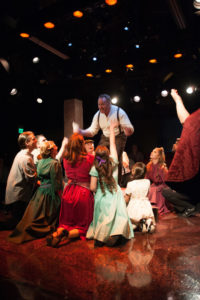
Directorially speaking, the production is the most fluid musical performance that Artistic Director Fuzz Roark has set to the stage in recent history. Flawlessly flowing from one moment to the next and clocking in just at the two-hour marker, Roark’s exacting precision of timing is a welcomed gift to this Webber-Rice sensation. What’s more impressive is Roark’s vision to submerge the theatergoers of Baltimore into the full Argentinian experience. This is not done with lavish set trappings that spill out into the lobby or by breaking the fourth wall in an irreverent fashion but rather with a basic framework tool that in its simplicity is strikingly beautiful. Roark projects an old film of the time in black and white onto the walls of the theatre, complete with sound, and though the cast sits lined on benches watching attentively, the projections are set in such a way that the actual audience becomes a part of the audience, including them in the chaos that unfurls once the death of Eva Perón breaks as news in the middle of the cinematic showing. Roark further cements the production in the annals of Baltimore theatre history by including area actor Dave Guy in the ensemble, the only performer to have performed in all four of the area’s productions of Evita over the last 30 years.
The other striking directorial choice that sets Roark’s production apart from others is the way he reinforces the presence of Santa Evita. Warning, as henceforth spoilers that follow concurrent to the plot of history follow. During the transition from the final montage into the “Lament” before Eva takes to singing her final moments, the mourners gather round her coffin while Eva herself dressed in her regal glittering balcony gown stands upon the balcony. Roark keeps her in plain sight and only dims her into the shadows with lighting, a symbolic representation that even though Eva Perón had faded from life the burning image of her immortality would be one that was visible even in the shrouded days of mourning to come. This striking visualization wraps the production full circle and packs a powerful emotional punch to the show as a whole.
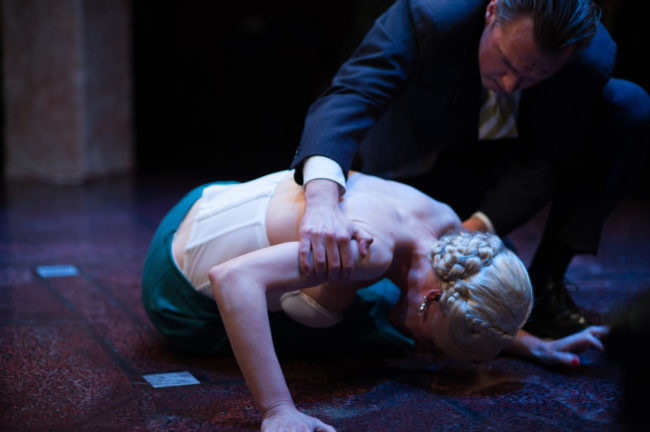
Musical Director Michael Tan works miraculous magic with Webber’s nearly impossible score. Rice and Webber being Titans of their time deliver a daunting masterpiece in Evita, which Tan sets to exploring, unpacking, and ultimately delivering in the truest and most enjoyable sense. His work with the ensemble to create a cohesive yet marvelously tuned sound is striking and carries with it an emotional commitment and fiery passion. The hard and fast delivery of recitatives continually throughout the principal character exchanges are Tan’s expertise as they land not only with lyrical soundness but emotional clarity every time they occur. Leading the pit orchestra on the keys, Tan showcases his versatility as musical performer as well and plays the score with earnest heart from the opening note through to the lead out at the show’s end.
A sturdy ensemble of just five males and five females create the sound of dozens in the intimate space and numbers like “A New Argentina” echo with vigor. “Perón’s Latest Flame” becomes a fierce delivery of attitudes wrapped in lyrical dissonance while the “Charity Concert— Luna Park Stadium” sequence features a hearty yet heavy chanting of Perón’s name in deeply rhythmic tones. When everyone is singing there is a strength to their songs, though when the ensemble splits down the line of men and women, the women outshine the men a bit in vocal quality. There is a ferocity, regardless of quality, that turns these singers into lively characters, particularly during moments of rabble-rousing and celebrating or commiserating in the streets that sits well against the emotional energy of the show as a whole.
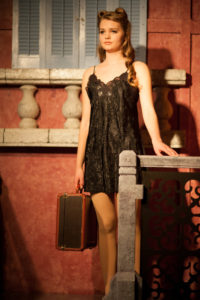
Clare Kneebone makes a remarkable cameo appearance at the top of the show as Teenage Eva. Her voice appears in finely pitched solos in the introductory sequences of the character and she is swift on her feet as a dancer. Though her and Magaldi (Steven Quintilian) quarrel initially, her voice is a strong match for his operatic sound. Quintilian, another featured cameo performer from among the ensemble, delivers a robust rendition of “On This Night of a Thousand Stars.” Rounding out the noteworthy trio of cameo performers, Claire Iverson, as The Mistress, delivers a dulcet sound laden heavy with melancholy for her solo “Another Suitcase in Another Hall.” Iverson captures that momentary eclipse of emotion between life in the fast lane and life at rock bottom and infuses these inflections into the song’s lyrics sublimely.
The narrative guide to the fairytale of Santa Eva, the harsh reality to the history of Eva Duarte Perón, the social commentary to the people’s story, Ché (Rob Wall) is a character of legends. Despite a few places where Wall’s voice simply cannot overpower the audience and the orchestra, his depiction of the street-savvy man is captivating. There is a sense of lively presence in his stance; there is a fortified notion of his own self-awareness that vibrates all around him when he sings his commentary on the story of Eva as it unfolds. His most enticing moments are those when he addresses the First Lady directly, no long just an observer on the periphery but an everyman in her direct path. “Waltz for Evita and Ché” is an evocative moment that is exceptionally well handled by both Wall and Evita (Becca Vourvoulas) as they spend the first half of the song vocally sparring while physically waltzing without ever touching.
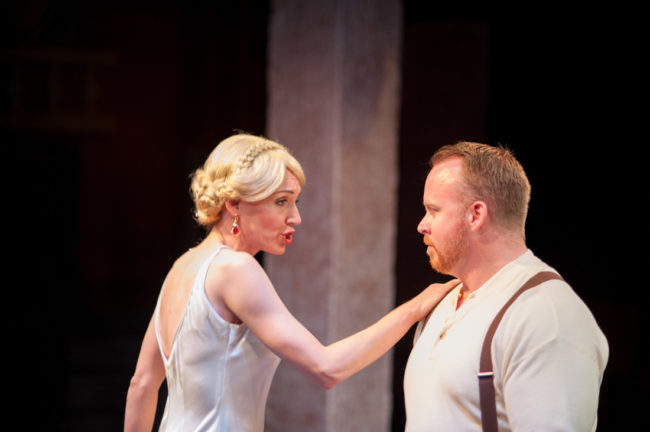
Wall’s voice is continually leading the ensemble in and out of numbers, a guiding beacon to the people of Argentina. “Santa Evita” is a prime example of these moments, and this number features the children (Lucia Keleman, Talia Lebowitz, and Maia Vong.) All three of the children possess cherubic voices that are perfectly suited for this number. Juxtaposed against the harsher rocker vocals of Wall, the number perfectly captures the dual nature of the story itself. It is the grit of the character that resonates within Wall’s performance that what draws the audience into the story.
The crowd chants, Perón. Perón! PERÓN! Played with an astounding vocal clarity by Bart Debicki, this enigmatic soldier, Juan Perón, rises to power amid the chaos of true love. Debicki’s voice is rich and velvety, layered heavily with emotional honesty that transforms numbers like “I’d Be Surprisingly Good For You” and his featured solo segments of “A New Argentina” into extraordinary musical examples of how character can be intensely dynamic. Debicki unearths a raw humanity in Perón, witnessed only when he is alone with Eva, but this exposes a gently flawed and earnestly human side to the otherwise stalwart and militaristic leader that is so often left unexplored in such a performance. His physical affections toward Eva are tender and laced with doting concern of a convivial nature.
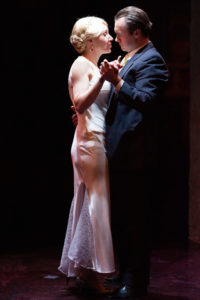
From the moment Debicki’s voice twines with Becca Vourvoulas, playing the title character, their spirits entwine and a marriage of souls echoes through “I’d Be Surprisingly Good For You.” The chemistry is a palpable energy that tethers the pair of performers together, even when at their most disagreeable point during “You Must Love Me.” Harrowing exchanges and one of the only spoken lines that happens in the production, Debicki delivers a cold and brutal but truthful blow to Vourvoulas who takes it on the chin with pride despite her shattering heart and the pair become an idyllic representation of love that even death cannot stopper.
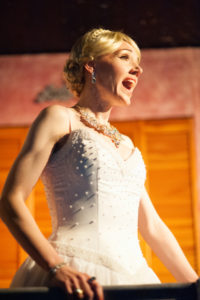
A true cross between a fantasy and a saint, Becca Vourvoulas takes to Eva Duarte Perón with all of the charismas of the princess the people adored and all of the ruthless determination that the first Lady of Argentina was known for. A true new world Madonna with a golden touch of charm spread thin as a veneer to shroud her inner cutthroat tendencies from radiating through, Vourvoulas mesmerizes as the title character, performing a circus-worthy balancing act between Eva Perón’s many faces. There is a rougher edge to her voice during a great many of the recitative exchanges, but this only serves to solidify the unyielding nature of her determination. “Don’t Cry for Me, Argentina” (credited as the number “On the Balcony of the Casa Rosada”) is delivered with stunning vocal grace by Vourvoulas. In the moment its heard it is touching and beautiful, but Vourvoulas quickly switches moods obliterating that vision as she sucks in the adoration of her people with a cocksure smugness that permeates every note of the song that follows. This rigorous and unapologetic demon of determination seizes “Rainbow High” and showcases how truly versatile Vourvoulas can be.
The evidence suggests that you must do you very best, to see this one in a life time sparkling gem of a musical theatre classic right here in Baltimore’s “big apple” stage at Spotlighters, lest you hang your head when Evita is here no longer to shine and dazzle the senses.
Running Time: 2 hours and 15 minutes with one intermission
Evita plays through May 15, 2016 at The Audrey Herman Spotlighters Theatre— 817 St. Paul Street in the historic Mount Vernon neighborhood of Baltimore City in Maryland. For tickets call the box office at (410) 752-1225 or purchase them online.
n

